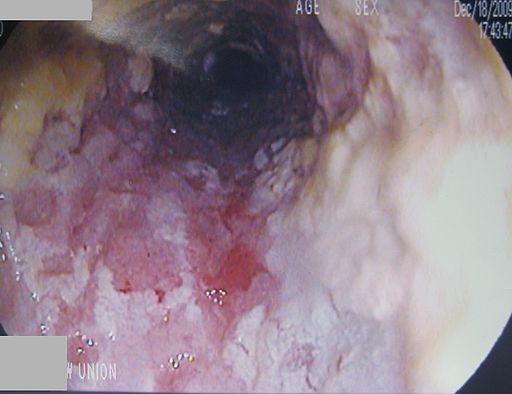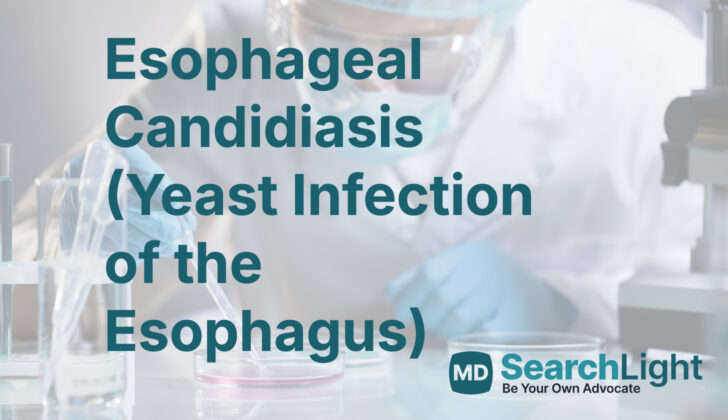What is Esophageal Candidiasis (Yeast Infection of the Esophagus)?
The most common type of infectious esophagitis, a condition in which the esophagus is infected, is due to esophageal candidiasis. It is observed that out of all individuals with infectious esophagitis, 88% are infected by a fungus called Candida albicans, 10% are infected by herpes simplex virus, and 2% are infected by cytomegalovirus. Esophageal candidiasis can cause a variety of symptoms, or in some cases, may show no symptoms at all. The most frequent symptoms include difficulty swallowing, painful swallowing, and a painful sensation behind the breastbone.
Candida infections of the esophagus are typically opportunistic infections, meaning they take advantage of weakened immune systems and are most often seen in people whose immune systems are suppressed. Candida is naturally found in the oral cavity, but when our body’s defenses are not working properly, this can enable the fungus to grow excessively on the lining of the esophagus, leading to a condition called esophageal candidiasis.
Fortunately, esophageal candidiasis can be treated with different varieties of oral and intravenous anti-fungal medications.
What Causes Esophageal Candidiasis (Yeast Infection of the Esophagus)?
The greatest risk of developing a yeast infection in the esophagus, called esophageal candidiasis, comes from having a weakened immune system. People with weakened immune system include those living with HIV or AIDS, undergoing chemotherapy, receiving radiation to the neck, taking antibiotics, using chronic steroids like systemic or inhaled corticosteroids, suffering from diabetes or adrenal insufficiency, and the elderly.
Research has found that the use of drugs called proton-pump inhibitors, which decrease stomach acid, is also a high risk factor for esophageal candidiasis in people with a normal immune system.
Risk Factors and Frequency for Esophageal Candidiasis (Yeast Infection of the Esophagus)
Esophageal candidiasis, a condition affecting the esophagus, doesn’t seem to favor one gender over the other. It’s generally associated with increasing age, HIV infection, and corticosteroid use. Typically, people around the age of 55.5 are most impacted. Though this condition isn’t very common in the general population, showing up in only about 0.32 to 5.2% of people, it’s more prevalent among HIV-positive patients, at around 9.8%. Particularly, HIV patients with less than 200 CD4 cells have a higher risk of developing esophageal candidiasis.
That being said, thanks to effective treatment using highly active antiretroviral therapy (HARRT), the condition seems to be becoming less common among HIV patients. However, for non-HIV patients, the rates appear to be on the rise, possibly due to the presence of other health conditions like diabetes, or the use of certain medications such as antibiotics and corticosteroids. Additionally, there’s evidence suggesting that smoking tobacco can increase the likelihood of developing esophageal candidiasis.

Signs and Symptoms of Esophageal Candidiasis (Yeast Infection of the Esophagus)
Esophageal candidiasis is a condition that can cause a variety of symptoms. However, sometimes it does not cause any noticeable symptoms at all. The most common symptoms are trouble swallowing (dysphagia), pain when swallowing (odynophagia), and pain behind the breastbone. Indeed, odynophagia is often the main indicator of esophageal candidiasis. Other possible symptoms can be stomach pain, burning sensation in the chest or heartburn, weight loss, diarrhea, nausea, and vomiting. In severe cases, people may also notice black, tarry stools (melena). An associated infection of the back of your throat (oropharynx) with candida can sometimes be the only noticeable sign.
- Trouble swallowing (dysphagia)
- Pain when swallowing (odynophagia)
- Pain behind the breastbone
- Stomach pain
- Heartburn
- Weight loss
- Diarrhea
- Nausea
- Vomiting
- Black, tarry stools (melena)
- Throat (oropharyngeal) candida infection – sometimes the only sign
Testing for Esophageal Candidiasis (Yeast Infection of the Esophagus)
Diagnosing a yeast infection in the esophagus, known as esophageal candidiasis, is done through a procedure called an upper endoscopy. During this procedure, the doctor uses a special camera to look inside your esophagus for signs of the infection.
Signs of infection include seeing a fungus called candida on the inner lining of the esophagus. These can look like white patches or a substance called exudates. These white or exudates specks are sticky and won’t be rinsed away by water. Sometimes, there might also be breaks or sores in the lining of the esophagus.
To confirm the infection, your doctor can take small samples of the white patches or the inner lining of the esophagus. These samples are then sent to a lab for further testing. This can confirm whether or not you have an esophageal yeast infection.
Treatment Options for Esophageal Candidiasis (Yeast Infection of the Esophagus)
Esophageal candidiasis, a fungal infection in the esophagus or food pipe, is typically treated with antifungal medicines. Unlike fungal infections in the mouth and throat, which can sometimes be treated with medicines applied directly to the affected area, esophageal candidiasis always requires systemic treatment – medication that works throughout your entire body.
Often, doctors prescribe a medication named fluconazole to tackle esophageal candidiasis. If you’re having trouble taking medication orally, an IV form of fluconazole can be used until you are able to swallow medicines. Other medicines, like micafungin, itraconazole, or voriconazole, are also used to treat this condition. But if these medicines don’t work, another medicine called amphotericin B might be used, but this is usually avoided because it can cause serious side effects. Another medicine, posaconazole, is also effective for particularly stubborn cases.
Caspofungin is another medication choice, preferred over amphotericin in some cases.
Because esophageal candidiasis can indicate problems with your immune system, it’s crucial for your doctor to identify and treat any underlying causes that might be weakening your immune system.
If a person with a weak immune system has symptoms of esophageal candidiasis like painful or difficult swallowing, doctors might start treating the infection right away without waiting for a specific diagnosis. If symptoms don’t improve after three days, the doctor may perform an upper endoscopy. It’s a test where a small camera is sent down your throat to examine your esophagus.
Be aware that some medications need to be adjusted if you have problems with your kidneys. Additionally, most antifungal treatments can potentially cause harm to an unborn baby, so if you’re pregnant, and have esophageal candidiasis, your doctor may prescribe amphotericin B instead.
What else can Esophageal Candidiasis (Yeast Infection of the Esophagus) be?
Esophagitis, the inflammation of the esophagus, can be caused by several factors. Here are a few of those common causes:
- Cytomegalovirus, a type of viral infection
- Herpes simplex virus, another viral infection
- Eosinophilic esophagitis, an allergic reaction
- Pill-induced esophagitis, which occurs when pills are taken without enough water
- Gastroesophageal reflux disease, where stomach acid backs up into the esophagus
- Radiation esophagitis, inflammation caused by radiation therapy
- Bacterial esophagitis, caused by different types of bacteria such as Lactobacillus, B-hemolytic streptococci, Cryptosporidium, Pneumocystis carinii, Mycobacterium avium complex, Nocardia, Mycobacterium tuberculosis, and Leishmania donovani
What to expect with Esophageal Candidiasis (Yeast Infection of the Esophagus)
There aren’t any particular studies that look into the long-term outcomes of esophageal candidiasis, a type of yeast infection in the esophagus. Usually, this condition can be treated effectively with antifungal medications. However, in some cases, the infection might not respond to the usual drugs or might come back frequently. In such situations, either different medications might be needed or continuing use of antifungal medications could be required to prevent the infection from coming back.
Possible Complications When Diagnosed with Esophageal Candidiasis (Yeast Infection of the Esophagus)
Complications that can occur following esophageal candidiasis, a condition caused by a fungus called candida infecting the esophagus, can lead to ulcers in the esophagus. These ulcers can potentially perforate or puncture the esophagus and cause bleeding in the upper part of the digestive system. Other complications of this condition can include weight loss, poor nourishment, bloodstream infection (sepsis), presence of the fungus in the blood (candidemia), restriction of the esophagus due to scarring and necking (esophageal stricture), as well as the creation of an abnormal connection between the esophagus and bronchial tree, called a fistula.
Common Complications:
- Esophageal ulcers
- Potential for esophageal perforation and upper gastrointestinal bleeding
- Weight loss
- Malnourishment
- Bloodstream infection (sepsis)
- Presence of the fungus in the blood (candidemia)
- Restriction of the esophagus due to scarring (esophageal stricture)
- Abnormal connection between the esophagus and bronchial tree (fistula formation)
Recovery from Esophageal Candidiasis (Yeast Infection of the Esophagus)
If a patient is being treated with a type of medicine called azoles, there’s a chance that their liver could be affected. Because of this, doctors should regularly check how the patient’s liver is functioning using special tests. Usually, this treatment doesn’t need to be long-term, unless the patient’s immune system is weakened or suppressed.
Preventing Esophageal Candidiasis (Yeast Infection of the Esophagus)
Candida, a type of yeast, is naturally present in our mouths; however, when the body’s immune system is weakened it can multiply and cause issues like esophagus infection. Therefore, managing conditions that weaken the immune system can reduce the risk of this infection. Furthermore, cutting down the use of antibiotics, steroids, and using inhaled steroids correctly may also help. For those who experience repeat infections, a preventative medication called fluconazole might be necessary.












